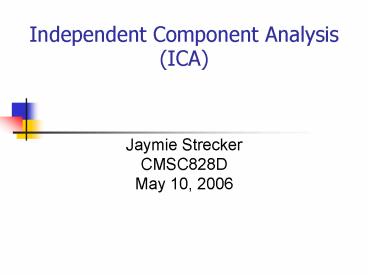Independent Component Analysis ICA PowerPoint PPT Presentation
1 / 25
Title: Independent Component Analysis ICA
1
Independent Component Analysis (ICA)
- Jaymie Strecker
- CMSC828D
- May 10, 2006
2
Outline
- ICA a data transformation
- Blind source separation
- Single-channel
- Multi-channel/spatial
- Other applications
- Identifiability of ICA model
- ICA model estimation
- FastICA
- History
3
Data transformation
- Suitable representation
- Suitable transformation
- Preprocessing for analysis
- Simple example speech recognition
4
Transformation problem
- Linear mixture
- Random variables xobserved, ssources
- Linear transform
- Solve for a and S
5
Selecting a transformation
- Optimize
- Dimension reduction
- Statistical interestingness
- Simplicity of W
- Application-oriented criteria
ICA
6
Statistical interestingness
- Find W that makes components si as statistically
independent as possible - Maximize some F(s1,,sm) that measures
independence - Objective (contrast) function deferred
- 2nd-order vs. higher-order measures of
interestingness
7
2nd-order linear trans.
- Use only the info in the covariance matrix of x
- Completely determined if x is Gaussian
- Minimize mean-square error
- Reduce data dimension
- Examples
- Principal component analysis (PCA)
- Factor analysis
8
Higher-order linear trans.
- Use info beyond covariance matrix of x
- x non- Gaussian
- Clustering
- Independence of components
- Examples
- Projection pursuit
- Redundancy reduction
- Blind deconvolution
9
2nd-order vs. higher-order
10
ICA and related methods
11
Blind source separation (BSS)
- Unknown aij (mixing weights), si
- Assume W exists and s non-Gaussian
- Solution with statistically independent
components is unique
12
Special cases of BSS
- Cocktail party problem
- n simultaneous speakers
- At least n listeners
- Denoising
- Brain signals (EEG and MEG)
- 23D and 122D signals
- Economic time series
13
Cocktail party demos
- http//www.cis.hut.fi/projects/ica/cocktail/cockta
il_en.cgi - ICA method
- http//www.cnl.salk.edu/tewon/Blind/blind_audio.h
tml - TDD-ICA hybrid method
14
Spatial audio and the cocktail party problem
- Certain factors can enhance ability to monitor
multiple speech sources - Number of talkers
- Sex of talker
- Spatial separation
- Temporal asynchrony
- Virtual spatial audio displays
(Nelson et al, 1999)
15
BSS and beamforming
- Both recover mixed signals
- BSS uses time and frequency info
- Adaptive beamforming uses spatial info
- Must know direction to aim
(Pan and Aboulnasr, 2005)
16
BSS with time delays
- Optimize to find weights and delays
(Torkkola, 1996)
17
Identifiability of ICA model
- Assume sources statistically independent
- Guaranteed when
- No more than one component of s is Gaussian
- m gt n
- m number of observed linear mixtures
- n number of independent components
- A has full column rank
18
Independence of components
- What does it mean for the components to be
independent? - Statistical independence
- f(y1,...,ym)f1(y1)f2(y2)...fm(ym)
- Uncorrelatedness (weaker)
19
ICA method
- ICA method Objective function Optimization
algorithm - Algorithm minimizes/maximizes function
20
Objective (contrast) function
- Multi-unit (all components at once)
- Likelihood
- Entropy
- Mutual information
- One-unit (one component at a time projection
pursuit) - Negentropy
- Kurtosis (a measure of non-Gaussianity)
21
Optimization algorithm
- Maximum likelihood or infomax
- Gradient ascent (stochastic or not)
- Non-linear PCA
- Iterative extract principal component
- Neural algorithms
- FastICA
- Can converge faster than stochastic gradient
ascent and neural algorithms
22
FastICA
- Fixed-point iteration
- Data has been sphered (covariance matrix equals
unity) - Comparison to neural algorithms
- Parallel and distributed
- Not adaptive uses sample averages computed over
sufficiently large data samples
23
FastICA Demo
- FastICA package for Matlab
- http//www.cis.hut.fi/projects/ica/fastica/
- Quick guided tour
- http//www.cis.hut.fi/projects/ica/icademo/
- Another implementation
- http//www.nic.uoregon.edu/hipersat/index.php
24
History
- Early 1980s Jerault, Jutten, Ans
- Neurophysiological problem (muscle contraction)
- 1990s wider use
- Infomax algorithm (Bell, Sejnowski)
- Connection to maximum likelihood (Amari et al)
- FastICA algorithm (Hyvarinen, Karhunen, Oja
- 1999 first international workshop
- 2006 6th International Conference on
Independent Component Analysis and Blind Source
Separation
25
References
- A. Hyvrainen, J. Karhunen, E. Oja. Independent
Component Analysis. 2001. (http//www.cis.hut.fi/p
rojects/ica/book/) - A. Hyvarinen. Survey on Independent Component
Analysis. 1999. (http//www.cis.hut.fi/aapo/paper
s/NCS99web/) - A. Hyvarinen, E. Oja. Independent Component
Analysis A Tutorial. 1999. (http//www.cis.hut.fi
/aapo/papers/IJCNN99_tutorialweb/) - W. T. Nelson, R. S. Bolia, M. A. Ericson, R. L.
McKinley. Spatial audio displays for speech
communications A comparison of free field and
virtual acoustic environments. 1999. - Q. Pan, T. Aboulnasr. Combined spatial/beamforming
and time/frequency processing for blind source
separation. 2005. - K. Torkkola. Blind separation of delayed sources
based on information maximization. 1996. - S. Ukai, T. Takatani, T. Nishikawa, H.
Saruwatari. Blind source separation combining
SIMO-model-based ICA and adaptive beamforming.
2005.

